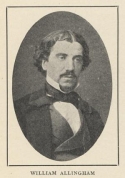In This Section
- Home
- About
- FAQ
- Published
- Captured
- Resources
- Celtic Studies, Bibliographies, Archives
- Maps of Ireland
- Antrim
- Armagh
- Carlow
- Cavan
- Clare
- Cork
- Donegal
- Down
- Dublin
- Fermanagh
- Galway
- Kerry
- Kildare
- Kilkenny
- King's County (today's Offaly)
- Leitrim
- Limerick
- Londonderry (Derry)
- Longford
- Louth
- Mayo
- Meath
- Monaghan
- Queen's County (today's Laois)
- Roscommon
- Sligo
- Tipperary
- Tyrone
- Waterford
- Westmeath
- Wexford
- Wicklow
- Related projects and sites
- TEI and XML
- Celtic scholars
- Irish writers
- Other
- People
Chronology of William Allingham

| 19 March 1824 | William Allingham is born in Ballyshannon, Co. Donegal, the eldest of five surviving children. |
| 1833 | His mother dies when Allingham is nine years old. |
| 1837 | He is sent to Boarding School at Killeshandra, Co. Cavan where he is unhappy. |
| 1838 | His father's health deteriorates. Allingham leaves school and takes up employment at a local bank where his father is manager. |
| 1843 | First visit to London. Begins correspondence with essayist and editor Leigh Hunt who supports Allingham's literary ambitions. |
| 1846 | Enters Customs Service as Principal Coast Officer in Donegal town, happy to quit bank job. |
| 1846 | Allingham starts collecting words of folk songs and ballads during his work-related travels, and writes ballads himself. |
| 1847 and after | Allingham meets Leigh Hunt and members of his circle (T. Carlyle, C. Patmore, and others) on holiday visits to London. |
| 1849 | Allingham is transferred to Ramsey, Isle of Man. |
| 1850 | He publishes his first book of poetry, dedicated to Leigh Hunt. It is not a commercial success. Allingham spends his holidays in London, meeting members of the Pre-Raphaelites such as D. G. Rossetti. |
| 1850 | Transferred to Coleraine. |
| 1850 | Meets Tennyson who had praised Allingham's poems at Twickenham. |
| 1854 | He resigns from the Customs Service, hoping to devote himself full-time to literature. Day and Night Songs published. After a few months he re-enters the Customs. He is posted to New Ross, Co. Wexford. |
| 1854 | First correspondence with Dante Gabriel Rossetti. Their letters cover the period 1854–1870. |
| 1855 | Allingham is posted to Ballyshannon, Co. Donegal. Day and Night Songs reissued with illustrations by Pre-Raphaelites Rossetti, Millais, and Hughes. |
| 1855 | The Music Master published. |
| 1860 | Nightingale Valley published. |
| 1860 | Poems published in Boston. |
| 1862 | Transfers to the London Docklands, he falls ill, has a nervous breakdown, and returns to Ballyshannon to recover. |
| 1863 | Transfers to the Customs in Lymington, Hampshire. He stays in England and visits friends, such as Tennyson, who live on the Isle of Wight. Laurence Bloomfield in Ireland published in serial form in Frazer's Magazine. |
| 1864 | Laurence Bloomfield in Ireland published as a book. The Ballad Book published. On recommendation of Lord Palmerston he is awarded an civil-list pension of £60 for his poetry annually. |
| 1865 | Fifty Modern Poems published. |
| 1866 | Allingham's father dies. William travels to Ireland for the last time. |
| 1870 | He retires from his Customs job and becomes sub-editor of Frazer's Magazine. His civil-list pension is increased to £ 100 annually. |
| 1873 | Rambles by Patricius Walker, a selection of poems fromFrazer's Magazine, published in book form. |
| 1874 | Allingham is appointed editor of Frazer's Magazine. |
| 22 August 1874 | Allingham marries Helen Mary Elizabeth Paterson, a watercolourist who is 24 years his junior, and a highly regarded illustrator of books and magazines. |
| 1875 | The couple lives in Chelsea. Their first child, Gerald Carlyle, is born. |
| 1877 | Songs, Ballads and Stories is published. |
| 1877 | Their second child, Eva Margaret, is born. |
| 1879 | Allingham resigns as editor of Frazer's Magazine. The Allinghams move to Sandhills near Witley, in Surrey. |
| 1881 | Allingham's long-standing friend Thomas Carlyle dies. The Allingham family moves to London. |
| 1882 | An Evil May-Day published. |
| 1882 | Their third child, Henry William, is born. |
| 1883 | The Play Ashby Manor published. |
| 1884 | Blackberries published. |
| 1887 | Irish Songs and Poems published. |
| 1888 | The Allinghams move to Hampstead. |
| 1889 | William Allingham's health deteriorates. Life and Phantasy published. |
| 18 November 1889 | Allingham dies at his home in Hampstead. He is cremated at Woking Cemetery. |
| 1889 | Allingham's ashes are buried in St. Anne's churchyard at Ballyshannon, where there is a commemorative slab. |
| 1888–93 | A collection of William Allingham's works in six volumes is published. |
| 1893 | Varieties in Prose is published. |
| 1907 | William Allingham: a Diary, edited by his wife Helen Allingham and Dollie Radford, is published. This work has remained in print for most of the 20th century. |
Sources:
Robert Welch, 'Allingham, William (1824–1889)', Oxford Dictionary of National Biography, Oxford University Press, 2004.
Alan Warner, William Allingham: an introduction (Dublin 1971).
The Poems of William Allingham, edited with an introduction by John Hewitt (Dublin: Dolmen 1967).
William Allingham, The Diaries, edited by Helen Allingham and Dollie Radford, introduction by John Julius Norwich. (London: The Folio Society 1990).
